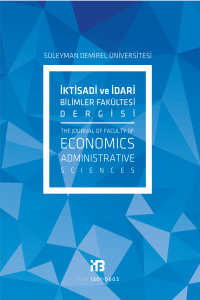AB’DE KAMU İHALELERİ VE İHALE SÖZLEŞMELERİ: İKTİSAT POLİTİKASI PERSPEKTİFİNDEN TARTIŞMA
Kamu İhale Kanunu, Sözleşme Hukuku, Avrupa Birliği, Su Temini
PUBLIC PROCUREMENT AND CONTRACT AWARD IN THE EU: DISCUSSION FROM ECONOMIC POLICY PERSPECTIVE
Kamu İhale Kanunu, Sözleşme Hukuku, Avrupa Birliği, Su Temini,
___
- BOVIS, C. (2012). EU Public Procurement Law, Edward Elgar Publishing, Cheltenham.
- BUNDESMINISTERIUM FÜR WİRTSCHAFT UND ENERGIE (2016). Ordinance on the Award of Public Contracts (Procurement Ordinance (Vergabeverordnung – VgV)), Federal Law Gazette I of 14 April 2016.
- COMMISSION of the EUROPEAN COMMUNITIES (2001). Green Paper: Promoting a European framework for Corporate Social Responsibility, Brussels, COM(2001) 366 final.
- EUROPEAN COMMISSION (2011a). Green Paper on the modernisation of EU public procurement policy: Towards a more efficient European Procurement Market, Brussels, 27.1.2011 COM(2011)15 final.
- EUROPEAN COMMISSION (2011b). Impact Assessment of an Initiative on Concessions: Proposal for a Directive of the European Parliament and of the Council on the Award of Concession Contracts, Brussels, {COM(2011) 897 final} {SEC(2011) 1589 final.
- EUROPEAN COMMISSION (2016). EU Public Procurement reform: Less bureaucracy, higher efficiency An overview of the new EU procurement and concession rules introduced on 18 April 2016.
- EUROPEAN PUBLIC SERVICE UNION (2013). ‘‘Commissioner Barnier's proposal to exclude water services success for Europe's citizens’’, https://www.epsu.org/article/commissioner-barniers-proposal-exclude-water-services-success-europes-citizens, 30.07.2022.
- FEDERAL MINISTRY OF JUSTICE (2013). ‘‘Gesetz gegen Wettbewerbsbeschränkungen – GWB)’’, https://www.gesetze-im-internet.de/englisch_gwb/englisch_gwb.html, 28.08.2022
- FRENZ, W. (2018). Vergaberecht EU und National, Springer-Verlag, Berlin.
- GRAELLS, A. S. (2015). Public procurement and the EU competition rules. Bloomsbury Publishing.
- HAMBURGER ABENDBLATT (2013). “Schwere Vorwürfe gegen Hamburg Energie”, https://www.abendblatt.de/wirtschaft/article122240983/Schwere-Vorwuerfe-gegen-Hamburg-Energie.html, 25.07.2022.
- HÖHN, M. I. (2010). Relational supply contracts: optimal concessions in return policies for continuous quality improvements (Vol. 629). Springer Science & Business Media, Berlin.
- NAUMANN, D. (2019). Vergaberecht: Grundzüge der öffentlichen Auftragsvergabe, Springer Fachmedien, Wiesbaden.
- OECD (2014) ‘‘Going green: best practices for green procurement’’, Smart Procurement, Austria Asfinag.
- OEM (2022). ‘‘About OEM’’ https://www.oem.se/en/about-oem-international, 01.07.2022.
- OFFICIAL JOURNAL of the EUROPEAN COMMUNITIES (1985a). Council directive of 27 June 1985 on the assessment of the effects of certain public and private projects on the environment, No L 175/40-48.
- OFFICIAL JOURNAL of the EUROPEAN COMMUNITIES (1985b). Council Decision of 27 June 1985 on the adoption of the Commission work programme concerning an experimental project for gathering, coordinating and ensuring the consistency of information on the state of the environment and natural resources in the Community, No L 176/ 14-17.
- OFFICIAL JOURNAL of the EUROPEAN COMMUNITIES (1991). Council Directive of 21 May 1991 concerning urban waste water treatment, No L 135/40-52.
- OFFICIAL JOURNAL of the EUROPEAN COMMUNITIES (1992). Council Directive 92/13 /EEC of 25 February 1992 coordinating the laws, regulations and administrative provisions relating to the application of Community rules on the procurement procedures of entities operating in the water, energy, transport and telecommunications sectors, No L 76/14-20.
- OFFICIAL JOURNAL of the EUROPEAN COMMUNITIES (1998). Council Directive 98/83/EC of 3 November 1998 on the quality of water intended for human consumption, L 330/32-54.
- OFFICIAL JOURNAL of the EUROPEAN COMMUNITIES (2000). Directive 2000/60/EC of the European Parliament and of the Council of 23 October 2000 establishing a framework for Community action in the field of water policy.
- OFFICIAL JOURNAL of the EUROPEAN UNION (2004a). Directive 2004/17/EC of the European Parliament and of the Council of 31 March 2004 coordinating the procurement procedures of entities operating in the water, energy, transport and postal services sectors, No L 134/1-113.
- OFFICIAL JOURNAL of the EUROPEAN UNION (2004b). Directive 2004/18/EC of the European Parliament and of the Council of 31 March 2004 on the coordination of procedures for the award of public works contracts, public supply contracts and public service contracts, L 134/114-240.
- OFFICIAL JOURNAL of the EUROPEAN UNION (2012). Consolidated versions of the treaty on European Union and the Treaty on the Functioning of the European Union, C326/20-55.
- OFFICIAL JOURNAL of the EUROPEAN UNION (2014a). Directive 2014/24/EU of the European Parliament and of the Council of 26 February 2014 on public procurement and repealing Directive 2004/18/EC, L94/65-242.
- OFFICIAL JOURNAL of the EUROPEAN UNION (2014b). Directive 2014/25/EU of the European Parliament and of the Council of 26 February 2014 on procurement by entities operating in the water, energy, transport and postal services sectors and repealing Directive 2004/17/EC, L 94/243-374.
- OFFICIAL JOURNAL of the EUROPEAN UNION (2014c). DIRECTIVE 2014/23/EU of the European Parliament and of the Council of 26 February 2014 on the award of concession contract, L 94/1-64.
- SCHEBESTA, H. (2016). Damages in EU public procurement law (Vol. 6). Cham: Springer.
- SOMACH, S. L. and HITCHINGS, A. M. (1996). Antitrust Considerations in Water Marketing. Natural Resources & Environment, 11(2), 26-67.
- WEI, Y. (2014). Regulating municipal water supply concessions: accountability in transitional China. Springer.
- WEIDENHOLZER, J. (2014). ‘‘Vergabepakete abgeschlossen’’, http://www.weidenholzer.eu/2014/02/14/vergabepaket-abgeschlossen/, 14.02.2022.
- WELT (2013). ‘‘Rechnungshof rügt Hamburg Energie’’, https://www.welt.de/print/die_welt/hamburg/article122257427/Rechnungshof-ruegt-Hamburg-Energie.html, 26.07.2022.
- WILLIAMSON, Oliver E. (1976). Franchise bidding for natural monopolies-in general and with respect to CATV. The Bell Journal of Economics, 73-104.
- ISSN: 1301-0603
- Yayın Aralığı: Yılda 3 Sayı
- Başlangıç: 1996
- Yayıncı: Süleyman Demirel Üniversitesi
AB’DE KAMU İHALELERİ VE İHALE SÖZLEŞMELERİ: İKTİSAT POLİTİKASI PERSPEKTİFİNDEN TARTIŞMA
AFGANİSTAN’DA ETNİK GRUPLAR VE SİYASAL YAPI
Akbarshah KHAWARNASAB, Mücahit AVCI
İŞLETMELERDE FİNANSAL SORUNLARIN TESPİTİ: ÖZEL EĞİTİM VE REHABİLİTASYON MERKEZLERİ ÖRNEĞİ
Sema KARAL, Tülay YEL, Meziyet Sema ERDEM
COVİD-19 PANDEMİSİNİN LOJİSTİK ŞİRKETLERİNİN FİNANSAL YAPISINA ETKİSİ: BIST’DE BİR ARAŞTIRMA
DEĞİŞEN İZLEME PRATİKLERİ VE SOSYAL MEDYA: TWITCH PLATFORMU ÜZERİNE BİR İNCELEME
ÜNİVERSİTE ÖĞRENCİLERİNİN YAŞLI AYRIMCILIĞINA İLİŞKİN TUTUMLARININ BELİRLENMESİ
ÇOCUK İHMAL VE İSTİSMARININ POLİTİKALARLA İLİŞKİSİ
OECD ÜLKELERİNİN İNOVASYON PERFORMANSLARININ CRITIC TEMELLİ OCRA YÖNTEMİYLE DEĞERLENDİRİLMESİ
